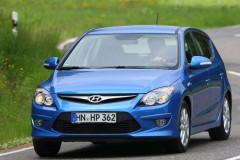Hyundai i30 2010 1.6i
Hyundai i30 2010 1.6 petrol description
Hatchback Hyundai i30 2010 1.6i has been produced from 2011 to 2012. It has four-cylinder petrol engine with displacement of 1.6 litres, which produces power of 126 horsepower on 6300 rpm - this is the most powerfull Hyundai i30 2010 - 2012 version and torque 157 Nm (Newton metres) on 4200 revolutions per minute.
This 4-cylinder 16-valve engine camshaft is driven by chain (What is an engine chain and belt? ). Engine has fuel injection system, this is an atmospheric engine (without turbine). Engine versions compliant with Euro 4 and Euro 5 emission standards available. Engine lifespan (mileage before major repairs or overhaul) can last from 180 up to 300 thousand kilometres. It is important to remember that engine life is highly dependent on regular maintenance and the quality of the oils and fuels used.
More engine specs
Overall, the engine is reliable and not very demanding on fuel quality. Fuel injectors tend to ...
This Hyundai i30 1.6 engine oil type is 0W-30, 5W-30 and oil capacity is 3.7 litres.
Hyundai i30 2010 1.6i has front wheel drive (FWD) and automatic gearbox with 4 gears.
Hyundai i30 2010 1.6i accelerates to speed 100 kilometres per hour in 12.1 seconds. The maximum speed of this car is 183 km/h.
Hyundai i30 2010 1.6i fuel consumption is 6.9 litres per 100km in combined city/highway mode (14.5 km/l), fuel consumption in city - 8.8 l/100km, highway fuel economy - 5.9 l/100km. Fuel tank capacity is 53 litres or 14 gallons, which gives a mileage up to 760 kilometers without refueling in urban cycle and even up to 880 kilometers on highway.

Hyundai i30 2010 1.6i technical data
| Model: | Hyundai i30 1.6i | ||
|---|---|---|---|
| Body style: | Hatchback | ||
| Production period: | 2011. January ... 2012. January | ||
| Engine: | 1591 cm3 Petrol, 4 cylinders | CO2 emissions: | 162 g/km |
| Power: | 126 HP ON 6300 RPM | Torque: | 157 NM ON 4200 RPM |
| Gearbox: | Automatic gearbox (4 gears) | Drive type: | Front wheel drive (FWD) |
| Top speed: | 183 km/h | Acceleration 0-100 km/h: | 12.1 seconds |
| Fuel consumption (l/100km): | 6.9 (combined) 8.8 (urban) 5.9 (highway) | ||
| Fuel tank capacity: | 53 litres (14 gallons) | ||
| Car dimensions: | 4.28m (length) 1.78m (width) 1.48m (height) | ||
| Turning diameter: | 10.2 meters | ||
| Trunk capacity: | 340 litres | ||
| Trunk max capacity: | 1250 litres (with rear seats folded down) | ||
| Gross weight: | 1740 kg | ||
Hyundai i30 2010 1.6i engine G4FC
Engine reliability and common problems:
Overall, the engine is reliable and not very demanding on fuel quality. Fuel injectors tend to be noisy. Timing chain resource is relatively low.Overall, this engine can last around 180,000 to 300,000 km if properly maintained, using the correct quality oil and fuel, and carrying out regular checks and maintenance.
| Engine displacement | 1591 cm3 |
|---|---|
| Number of cylinders | 4 |
| Bore (cylinder diameter) | 77 mm |
| Stroke length (piston move) | 85.4 mm |
| Compression ratio | 10.5 : 1 |
| Camshaft drive | Timing chain Chain motors are considered more reliable, chain replacement usually is required less often than a timing belt, but they are often louder and vibrate more. More service info |
| Timing chain change interval | 180,000 km (recommended) Sometimes manufacturers do not specify timing chain replacement intervals and design chains for engine life. However, once the recommended change interval has been reached, it is recommended to periodically check the condition of the chain and to change the chain if excessive stretching is detected or if unusual noises from the engine or other symptoms occur. |
| Fuel system | Injection |
| Hyundai i30 2010 1.6i oil type | 0W-30, 5W-30 |
| Oil capacity | 3.7 litres (3.9 quarts) More service info |
| Power | 120 - 128 HP ON 6300 RPM |
| Torque | 154 - 158 NM ON 4200 RPM |
| Start of production (year) | 2006 |
| Duration of production | 20 years |
| Engine also used on | Kia Ceed Hyundai Elantra Hyundai Accent Kia RIO and 5 other models |
Generally, the use of an engine in several models and its long production run is an indication of the quality of the engine and the success of its design. |
Most often compared to
All Hyundai i30 hatchback [2010 - 2012] modifications
| Modification | Engine | Power | Consumption | Gearbox |
|---|---|---|---|---|
|
Hyundai i30 2010 1.4i
Jan 2010 — Jan 2012 Most fuel efficient petrol version |
1.4 Petrol | 109 HP | 5.8 l/100km | Manual (5) |
|
Hyundai i30 2011 1.6i
Jan 2011 — Jan 2012 Most dynamic version - 100 km/h in 11 seconds |
1.6 Petrol | 126 HP | 5.9 l/100km | Manual (5) |
|
Hyundai i30 2011 1.6i
Jan 2011 — Jan 2012 Most powerfull petrol version (126 HP) |
1.6 Petrol | 126 HP | 6.9 l/100km | Automatic (4) |
|
Hyundai i30 2010 1.6 CRDi
Most fuel efficient diesel version |
1.6 Diesel | 90 HP | 4.4 l/100km | Manual (6) |
|
Hyundai i30 2010 1.6 CRDi
Jan 2010 — Jan 2012 Most powerfull diesel version (115 HP) |
1.6 Diesel | 115 HP | 4.4 l/100km | Manual (6) |
|
Hyundai i30 2010 1.6 CRDi
Jan 2010 — Jan 2012 Most powerfull diesel version (115 HP) |
1.6 Diesel | 115 HP | 5.7 l/100km | Automatic (4) |
